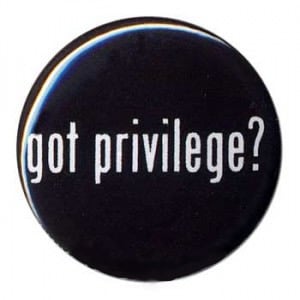I'm still settling in to Bogotá, so forgive me for reposting again. Over on everyday feminism, Jamie Utt, wrote an article on how to do this. His key points are excerpted below:
1. Start By Appealing To the Ways In Which They Don’t Have Privilege
One of the fastest ways to disarm a person’s defensiveness about their own privilege is to take some time to listen to the ways in which they legitimately do not have privilege and validate those frustrations.I once attended a workshop with Peggy McIntosh, the original author of “Unpacking the Invisible Knapsack.” The goal of the workshop was to give people tools for leading workshops of their own on privilege and oppression that get past the defensiveness.
One of her suggestions was to have people divide a paper in half. Have every person start on the left side of the paper and write down all of the ways in which they do not have identity privilege. They can include everything from being left handed and having to drag your hand through the ink to being a woman and having to deal with the gender wage gap. Then folks would write on the opposite side all of the ways in which their identity does afford them privilege that they did not earn.
From there, folks pair up and do a listening exercise where they listen intently to the other person talk about both sides of their list. Doing so allows people to air their frustrations at being denied privilege while also acknowledging that they do, indeed, have privilege.
From that place, it is a lot easier to help folks understand the power of privilege in creating a system of oppression and how eliminating that system is liberatory and transformative for everyone.
Now, to do this, you don’t need to turn it into a workshop. Just try asking the other person to talk about the ways in which they don’t have identity privilege and validate those hurts and frustrations.
Simply listening can go a long way! Plus, it’s a starting point for helping them build empathy for those who do not have their same privileges.
2. Stress That Privilege Is Relative
Each person experiences their privilege and lack thereof within the context of their own community and the people they interact with at the time.As such, privilege is relative, and we need to talk about it that way.
Does that mean that all privileges are equal? No. I’m right handed and in turn, don’t have to drag my palm through the ink when I write. That’s a privilege I have by the nature of my birth.
That is not to say, though, that my right-handed privilege bears the same weight or social responsibility as the privilege that my skin color, gender, wealth, or sexual orientation afford me.
The point is that our identities are complex and intersectional.
Some folks get defensive about discussing privilege because they fear such a conversation will not address the real and powerful ways in which they do not have privilege. So they deflect by only talking about those things.
Just because we benefit from one form of privilege doesn’t mean that we benefit from all forms of privilege.
When we realize that, we can work together with people who share our privileges and those who don’t to build something better!
3. A System of Privilege and Oppression Hurts Us All
What we most need to stress in conversations about privilege is that this system doesn’t just hurt the people who cannot boast one form of identity privilege or another.It hurts everyone. Until we understand that, we’re not getting anywhere because the only people of privilege who will ever act to end the system are the ones acting strictly from paternalistic guilt.
Take white privilege, for instance. White privilege is, essentially, a social construction whereby wealthy Europeans wanted to make sure that they could consolidate their wealth by pitting poor people from Europe against poor Africans and Indigenous people.
White folks were made to feel better about themselves and were given paltry privileges over people of color in order to divide the white proletariat.
All that meant, though, is that the white folks got to be the lords over people of color while the wealthy whites still had their boots on the necks of poor whites!
These privileges don’t help us as white people nearly as much as they hurt us!
Similarly, male privilege may benefit men tremendously in certain ways. But in others, it restricts us into a tiny box of masculinity. I don’t know about you, but I am sick of trying to fit into my gendered box, the “Act Like a Man” box.
I want my gender expression to be free and independent of those aspects of masculinity that hurt men and women – violence is acceptable for solving problems, boys don’t cry, men are the lords of their household, men must know everything even when they don’t, etc.
The privileges are marginal when we look at the system of justice that can be built on the other side of this struggle!
4. Privilege Does Not Have To Mean Guilt!
....5. Offer Concrete Ways That They Can Undermine the System of Privilege and Oppression In Their Own Life
....6. Make It a Conversation of Actions, Not Character
...- read his full take on the last three here, and more from Jamie over at his change from within blog

No comments:
Post a Comment